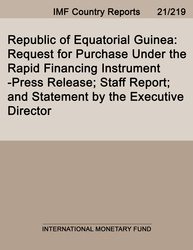
Republic of Equatorial Guinea: Request for Purchase Under the Rapid Financing Instrument-Press Release; Staff Report; and Statement by the Executive Director
Request for Purchase Under the Rapid Financing Instrument-Press Release; Staff Report; and Statement by the Executive Director
READ MORE...
Volume/Issue:
Volume 2021
Issue 219
Publication date: September 2021
ISBN: 9781513595849
$5.00
Add to Cart by clicking price of the language and format you'd like to purchase
Available Languages and Formats
| English | |||
| Spanish |
Prices in red indicate formats that are not yet available but are forthcoming.
Topics covered in this book
This title contains information about the following subjects.
Click on a subject if you would like to see other titles with the same subjects.
Also of interest
Summary
Already battered by a still unfolding COVID-19 pandemic, Equatorial Guinea was struck on March 7 by massive accidental explosions at a military compound in Bata, its largest city, that killed over 100 people and caused widespread damage to surrounding neighborhoods. These shocks have adversely impacted economic activity and weakened considerably the fiscal and external positions, relative to the EFF-supported program approved in December 2019, creating a substantial financing gap. With the EFF-supported program off-track, as governance reforms have taken longer than originally envisaged, it is not feasible to effectively respond to the humanitarian crisis within the EFF framework. Bringing the program back on track would take time as the authorities continue to work on outstanding structural measures due to capacity constraints in the pandemic context and need for consensus building. Support provided under the RFI, buttressed by appropriate prior actions on governance and safeguards, would create the fiscal space necessary for the authorities to meet the immediate humanitarian needs, and reinvigorate engagement under the EFF-supported program.
Copyright © 2010 - 2026
Powered by:
AIDC



